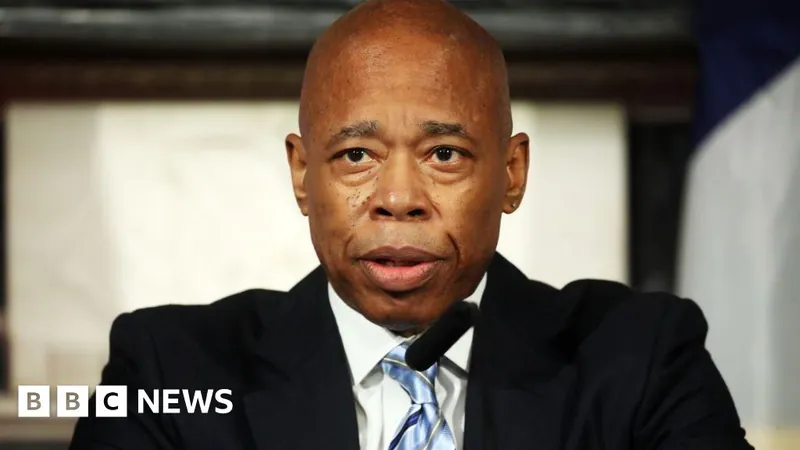
NYC Mayor Eric Adams' Criminal Charges Dismissed: What This Means for the City and His Future
2025-04-02
Author: Benjamin
In a surprising turn of events, a federal judge has permanently dismissed the criminal case against New York City Mayor Eric Adams. This decision comes just weeks after the Trump administration prompted prosecutors to drop corruption charges against the mayor, leading to a significant shake-up in the Manhattan federal prosecutor's office.
The case, which was officially dismissed "with prejudice," ensures that the Department of Justice (DOJ) cannot refile charges against Adams based on the same evidence. This development comes after Adams faced serious allegations, including conspiracy, fraud, soliciting illegal campaign contributions, and bribery. He has consistently denied any wrongdoing throughout the proceedings.
The initial allegations against Adams revolved around claims that he accepted gifts worth over $100,000 from Turkish nationals in exchange for favorable treatment. However, in a controversial directive, acting deputy attorney general Emil Bove—appointed by Trump—ordered New York prosecutors to drop the case, asserting that it hindered Adams' ability to combat illegal immigration and violent crime, key objectives of the Trump administration.
This dismissal triggered strong reactions within the DOJ, leading to the resignation of Manhattan's top federal prosecutor, Danielle Sassoon, along with six other high-level officials. Sassoon's exit was fueled by accusations that the mayor's office had effectively engaged in a "quid pro quo," indicating a potential exchange of dismissing the indictment for support of the administration's policies.
US District Judge Dale Ho expressed skepticism regarding the rationale provided by the DOJ, highlighting the perception that the indictment could be used as leverage over Adams and the city. He emphasized that dismissing the case without prejudice could make it seem as if the mayor's political decisions were being influenced more by the federal government than by the needs of his constituents.
While acknowledging that his ruling might not satisfy everyone, Judge Ho clarified that the judiciary does not have the authority to compel the DOJ to continue prosecuting a case it has decided to abandon. His comments suggested a broader concern about the politicization of legal actions and the implications for public trust in the justice system.
A DOJ spokesperson characterized the case as an instance of political weaponization, asserting a renewed focus on prioritizing national security rather than targeting local officials. Meanwhile, Adams' attorney, Alex Spiro, celebrated the court's ruling, claiming, "The case against Eric Adams should have never been brought in the first place—and finally today that case is gone forever."
As New York City moves forward from this scandal, the implications for Adams' administration and his ability to govern without interference from federal authorities remain to be seen. The ruling not only marks a decisive moment in the mayor's political journey but also raises critical questions about the intersection of law, politics, and public service in America. How this will affect Adams’ approach to governance amid ongoing national debates surrounding immigration and crime will be closely scrutinized in the months ahead.









 Brasil (PT)
Brasil (PT)
 Canada (EN)
Canada (EN)
 Chile (ES)
Chile (ES)
 Česko (CS)
Česko (CS)
 대한민국 (KO)
대한민국 (KO)
 España (ES)
España (ES)
 France (FR)
France (FR)
 Hong Kong (EN)
Hong Kong (EN)
 Italia (IT)
Italia (IT)
 日本 (JA)
日本 (JA)
 Magyarország (HU)
Magyarország (HU)
 Norge (NO)
Norge (NO)
 Polska (PL)
Polska (PL)
 Schweiz (DE)
Schweiz (DE)
 Singapore (EN)
Singapore (EN)
 Sverige (SV)
Sverige (SV)
 Suomi (FI)
Suomi (FI)
 Türkiye (TR)
Türkiye (TR)
 الإمارات العربية المتحدة (AR)
الإمارات العربية المتحدة (AR)